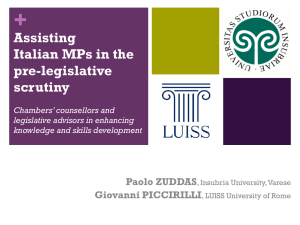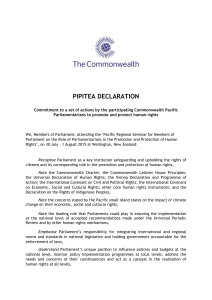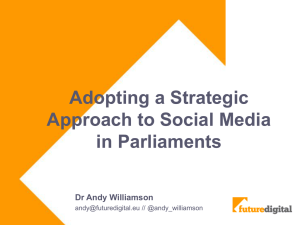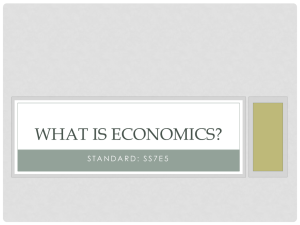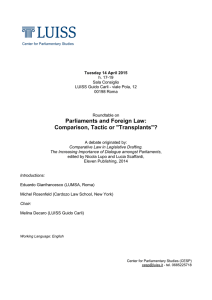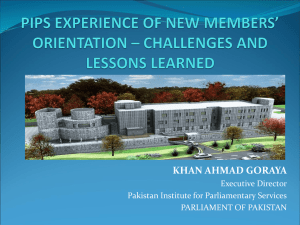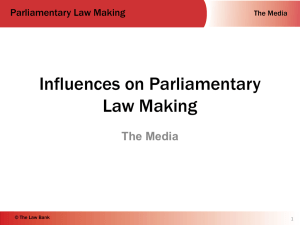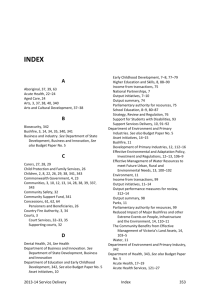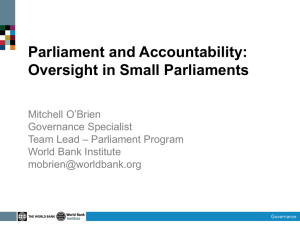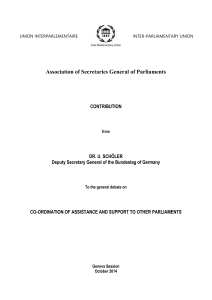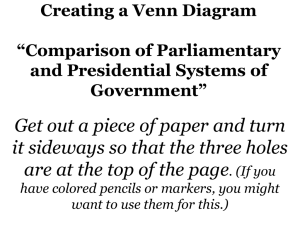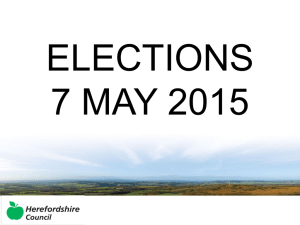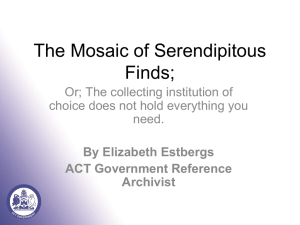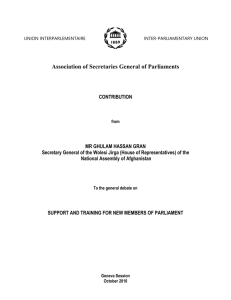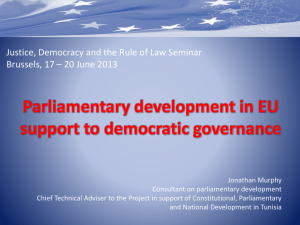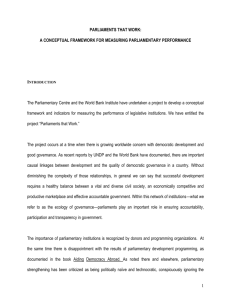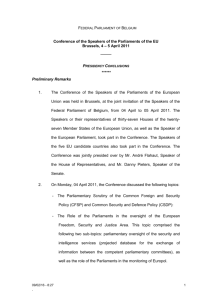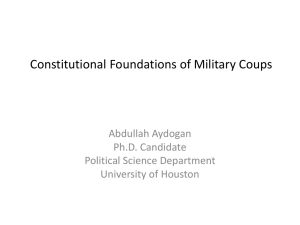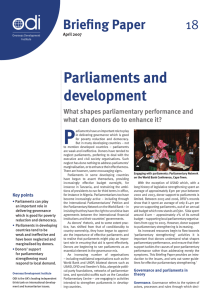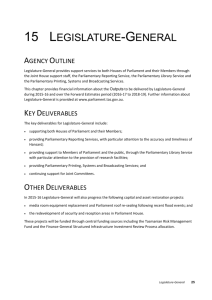Parliamentary Support
advertisement
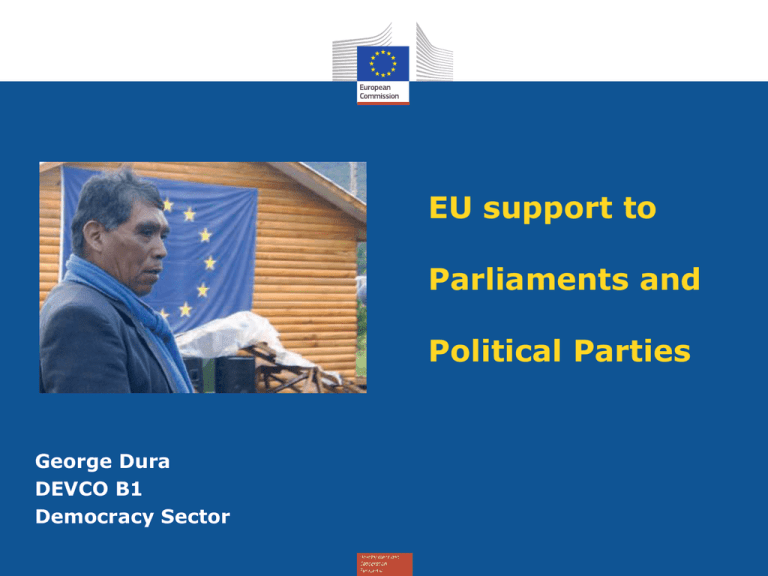
EU support to Parliaments and Political Parties George Dura DEVCO B1 Democracy Sector Parliamentary Support • Parliaments are a key component of every democracy • Important entry point for popular participation and domestic accountability • Strengthening Parliamentary Functions • Legislative • Representative • Oversight • National Budget Parliamentary Support • Relatively young field in democracy support • Support through capacity building and/or budget support programmes • Traditional parliamentary support focused on: • Capacity building of MPs and administrative staff • Strengthening internal organization • Strong focus on Lawmaking Parliamentary Support Today: The Way Forward • Need to refocus support on strengthening oversight, outreach and representation Areas of attention: National budget process, security sector • Connect Parliament with citizens: CSOs & Media • EIDHR: support to parliamentary monitoring, watchdog CSOs, thinks thanks – facilitating interaction CSOs & Parliamentary Committees • Need to integrate parliamentary support in broader democratic and/or transitional processes (+ newly elected parliaments) • An EU project strengthens the involvement of Morocco’s parliamentarians in the state’s budgetary process and serves to help them better understand technical issues behind it as well as strengthen their involvement in the Ministry of Finance’s ongoing reform of Morocco’s finance law. Morocco • Specific project on strengthening domestic accountability and Morocco’s parliament – through EIDHR with only 100000 EUR • Aim: strengthening Morrocan MPs’ involvement in the national budgetary process and their involvement in the reform of Morocco’s finance law, by • • • Targeting 30 MPs from different political parties Training activities, analytical reports, reflexion workshops Main project outcomes: • • • Authoritative multi-party report, serving as a reference manual and outlining the Parliament’s vision on budget reform. Proposed legislation political enhancement of the Moroccan Parliament and strengthened the balance of political institutions. Senegal, Kyrgyzstan Several models of parliamentary strengthening • 1. Short-term, ad hoc to develop the capacity of parliament (MPs + staff) on functions, procedure and duties. • 2. Multi-year programmes focused on focused on institutional and organisational reform. • 3. Integrated multi-year democracy programmes with parliaments as only one element of the programme and also including support to other democratic institutions and organisations. • 4. Issue-based programmes to achieve more targeted, policy objectives, either as a project or as a broader sectoral programme. • Need to work on outreach of parliaments to CSOs, media, political parties and constituencies. Effective parliament support programmes 1. understand political economy of the parliaments and use PEA in programming 2. driven from within – either by MPs/staff/CSOs – with interventions tailored according to needs/demand 3. treat parliaments as part of the broader political system and domestic accountability mechanisms 4. work around specific policy issues rather than generic activities 5. encourage south-south learning 6. long-term approach and realistic about what can be achieved EU support to the National Assembly of Senegal Assessment of Parliament’s needs (political economy) High-level buy-in and support (Speaker – President) – push for adoption of broad reform strategy (R&P) Ownership of reform agenda Timing – new legislature, 90% new MPs (clean slate) 45% women MPs – tailor programme to their needs Oversight budgetary process: increase interaction with SAI, MinFin, MinGov (DA strengthening) Outreach – create links with CSOs providing policy input to various Cttees + promoting broader debate on media law Election follow-up Cross-party issues – anti-corruption caucus, women’s group Support staffing and revision of career structure infrastructure, interpretation services (entry-point) 2010 Reference Document: ‘Engaging and supporting Parliament worldwide’ • Review of EU policy framework and past experiences in parliamentary support worldwide • Guidelines and Strategies for Programming and Implementation • Importance of preconditions and assessment phase: Parliamentary Assessment Framework Performance Indicators for EU Parliamentary Support (2012) • Improve the design and implementation of parliamentary support projects • Seven theme areas of parliamentary support: Legislation, Oversight, Budget, Representation, Administration, Inclusivity and Institution-building • Identify positive impacts of parliamentary support projects on the effectiveness of parliaments in carrying out their functions EU support to political parties • Often the weakest link in emerging democracies • Too often neglected by international aid • Yes, it is delicate business, but multiparty support should be considered as an essential part of democracy support • Focus on • Legal framework • Capacity building: internal organisation, internal democracy, agenda setting, campaigning • Party-to-party dialogue • Integrated as part of electoral and parliamentary support • EIDHR: while indeed we cannot fund specific parties, we can support parties through political foundations and CSOs (e.g. Tunisia) An EU project implemented by the Konrad Adenauer Foundation and local partners strengthens emerging political parties. The project has been key in promoting dialogue surrounding issues such as the electoral process, freedom of expression and political tolerance through the organization of debates and trainings, bringing together the key concerned actors, be they political parties, NGOs or institutions. It has also supported more pragmatic, but pivotal, aspects for political parties such as the role of a party and its organizational structure in a democracy, covering topics such as the selection of candidates, the role of women, and keeping MPs and party leaders in touch with the electorate. Thank you for your attention
